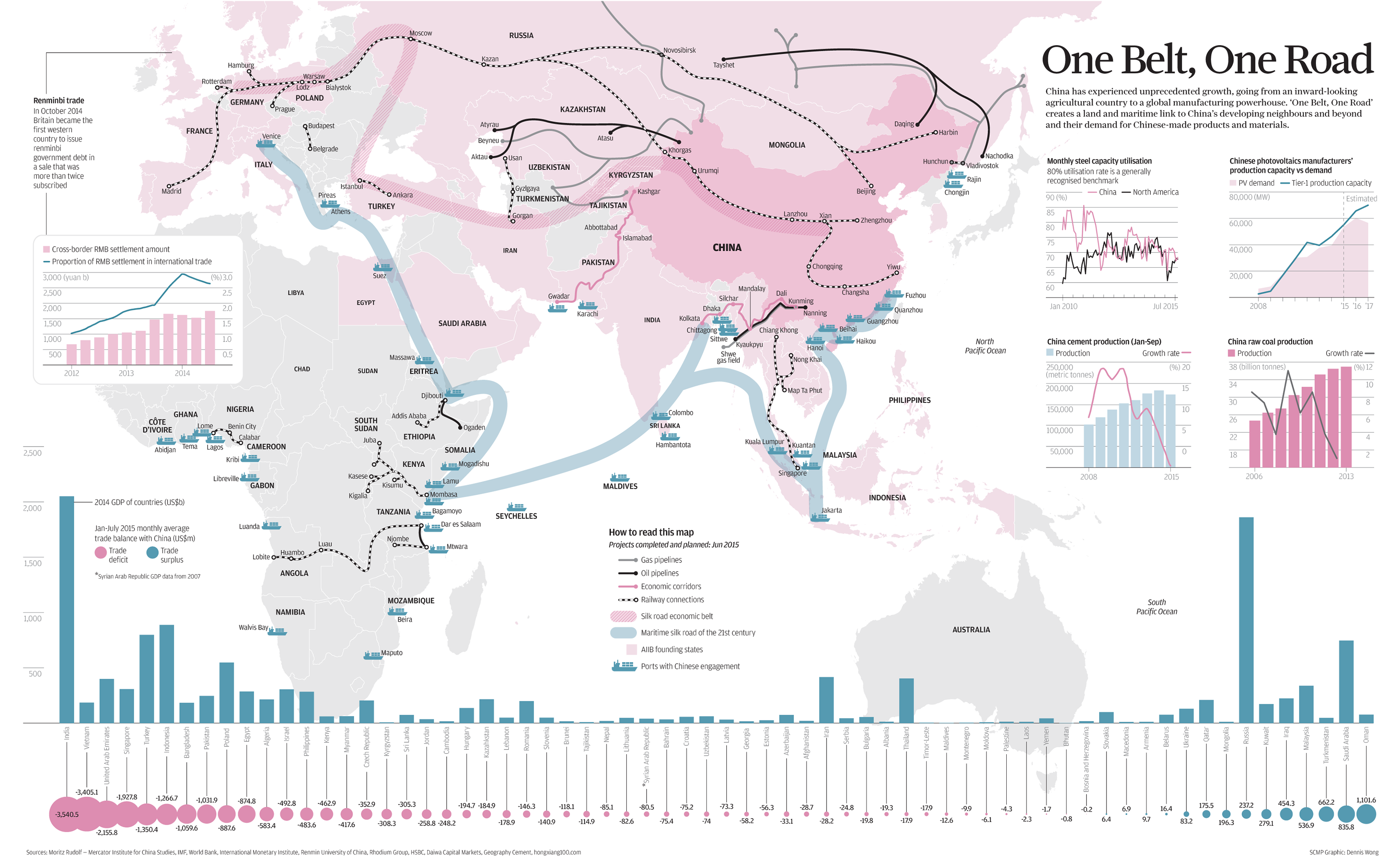Hi delegates!
The Belt and Road Initiative (BRI) is arguably Beijing's most ambitious economic and diplomatic since the founding of the People's Republic of China. This $1 trillion plan involves massive infrastructure projects that span more than 60 countries. It has the potential to be the world's largest platform for regional collaboration.
The BRI refers to the Silk Road Economic Belt and 21st Century Maritime Silk Road. Unveiled in 2013 as "One Belt, One Road" (OBOR), the BRI is President Xi Jinping's flagship foreign policy.
Here are some articles on the BRI that may be helpful for your research:
Questions to consider:
1. How can Chinese infrastructure investment in Central Asia, Europe, and Africa by land and sea benefit the Chinese economy?
2. How will the BRI reshape global trade?
3. What are the risks involved with such a large-scale plan?
4. How do other Asian countries view the BRI? What about the US?

As the Belt Road Initiative is set to take place within sixty-eight countries, many of the invited member states are concerned about the prospect that this initiative is a way for China to bolster their private companies. It is said that because President Xi had pledged $124 billion for the initiative, Western countries have voiced their concern for the predominant Chinese influence in this project. There has been a surge in the amount of private Chinese companies linked to the investments regarding the Belt Road Initiative such as the Fosun Group, HNA Group, and the Dalian Wanda Group. This initiative will benefit the Chinese in a multitude of ways for example, in the long term the BRI is an investment because there are funds that will be allocated to Chinese banks and state finds. So far, the Chinese have conducted themselves in an $11.6 billion buyout in Singapore based Global Logistics Properties. In addition to that, the state owned China National Petroleum Corporation has bought out $1.8 billion ownership of 8% of the Abu Dhabi oil company. The way the BRI will benefit the Chinese economy is because Chinese loans will be the basis of the infrastructure projects. For example as of late, countries such as Zimbabwe owe China over $1 billion in debt because China had foreign investments in their infrastructure. Having China being the base of this project, other countries would only be able to modify by adding international supply chains and not be the main benefactor. Member countries would only profit as the transshipment points but the revenues from the resulting economic boom from the BRI would repay Chinese loans on top of the accrued interest rates. Alongside the loans, China would benefit from the new markets for Chinese companies because of their excess in cement, steel, alongside other building materials. In conclusion, the Chinese economy will benefit from the financing, and construction of the BRI.
ReplyDeleteThe BRI’s main objective was to build up trade, investment, and infrastructure networking which would connect parts of Asia with Europe and Africa; simulating a modernized Silk Road. The institution of revolutionized infrastructure such as roads, ports, airports, and high speed rail systems will create greater cooperation between nations, completely expanding foreign investments and bilateral trade. The BRI is said to tie together two ends of Eurasia alongside Africa and Oceania through two routes, one overland and one maritime. This allows for major financial cooperation, cultural exchanges, and tourism will be a large chunk of appeal to this project.
The risks include that if the project fails states could amass billions of dollars in non performing loans. The issue is that loans are being given to insecure countries with risky infrastructure initiatives. In addition, countries with high soft-budget constraints alongside a large number of firms may go bankrupt while struggling for financing.
An overwhelming consensus is that the BRI is a competitive initiative to compete against the United States compared to NAFTA and the Trans-pacific Partnership. Countries like Sri Lanka, India, Pakistan, Japan and Myanmar refuse to take part of BRI. Japan and India has instead decided to create their own infrastructure project in order to ensure stability in the Asia-Pacific region in response to China’s power projection policies. Their projects like the Chennai-Bangalore corridor display the willingness of trying to diplomatic partnerships in attempt to move away from Chinese control. Regarding the United States, the Trump Administration has taken on an “America First” policy in which the United States will recognize the BRI but will not take part in it and invest money into the infrastructure project for now.
-Secretary of Homeland Security